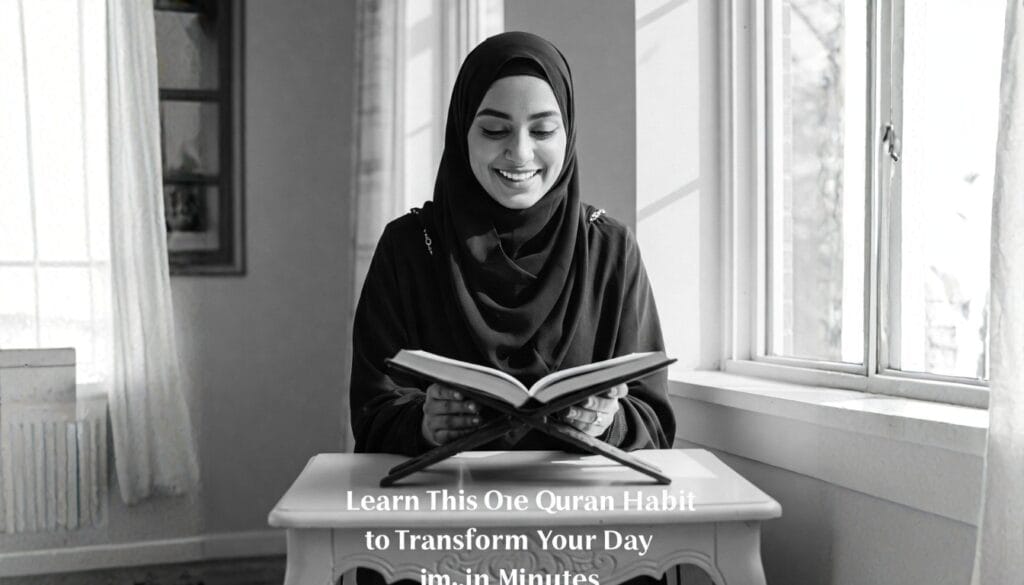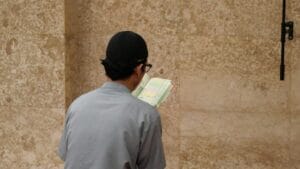In the chaos of modern life, finding moments of peace, focus, and spiritual connection can feel like an uphill battle. Yet, there’s one simple habit rooted in the Quran that can transform your day in just minutes: the daily recitation of Quranic duas (supplications). These divine prayers, drawn from Allah’s eternal words, are powerful tools for cultivating tranquility, boosting productivity, and inviting blessings into every aspect of your life. This comprehensive guide explores how the habit of reciting specific duas can revolutionize your daily routine, offering ten impactful supplications to address common challenges like stress, lack of focus, and spiritual disconnection.
The Quran, described as “a guidance for those who are conscious of Allah” (Surah Al-Baqarah 2:2), provides duas that are both practical and profound. By making their recitation a daily habit, you can start your day with purpose, navigate challenges with faith, and end it with gratitude. This article delves into the transformative power of this one Quran habit, sharing step-by-step tips, ten powerful duas, and curated resources to make it easy and rewarding. Whether you’re a busy professional, a student, or a parent, this habit will bring divine light to your day in mere minutes.

Introduction: The Power of a Single Quran Habit
The Quran is a divine gift, offering solutions to every human need—emotional, spiritual, and practical. Allah (SWT) declares, “We have not neglected in the Book a thing” (Surah Al-An’am 6:38), ensuring that its verses address every moment of our lives. Among its treasures are duas—supplications that connect us directly to Allah’s mercy. The Prophet Muhammad (PBUH) said, “Dua is the essence of worship” (Tirmidhi), highlighting its ability to transform our hearts and days.
In today’s fast-paced world, where distractions and stress dominate, a single Quran habit—reciting duas daily—can be a game-changer. This habit takes just minutes but delivers profound benefits: peace of mind, spiritual focus, and divine blessings. This article explores how to build this habit, featuring ten Quranic duas to enhance your day, from morning motivation to evening gratitude. You’ll also find practical tips, recommended resources, and inspiring stories to make this habit a seamless part of your life. Start now, and discover how a few minutes with the Quran can transform your day.
Here’s what you’ll gain:
- A simple Quran habit to transform your day in minutes.
- Ten powerful Quranic duas with Arabic text, transliteration, and translations.
- Practical applications for daily challenges like stress, productivity, and spiritual growth.
- Curated resources—books, apps, and courses—with prices, reviews, and ratings.
- Real-life stories and FAQs to inspire and guide you.
Let’s unlock the transformative power of this one Quran habit and make your days brighter.
Why This One Quran Habit Matters
A Spiritual Anchor for Your Day
Reciting Quranic duas daily is a form of dhikr (remembrance of Allah), which the Quran describes as a source of tranquility: “Indeed, in the remembrance of Allah do hearts find rest” (Surah Ar-Ra’d 13:28). This habit grounds you in faith, starting and ending your day with a connection to Allah (SWT). It’s a reminder of His presence, fostering tawakkul (trust) and spiritual resilience.
Read more:
Emotional and Practical Benefits
Beyond its spiritual value, this habit offers emotional and practical benefits. The rhythmic recitation of duas has a meditative effect, reducing stress and enhancing focus. Studies on prayer show that spiritual practices lower anxiety and improve mental clarity, making you better equipped to handle daily challenges. For Muslims, duas like those for guidance or protection provide a sense of purpose and security, transforming how you approach your day.
Transforming Minutes into Miracles
The beauty of this habit lies in its simplicity—it takes just minutes but delivers lifelong rewards. The Prophet (PBUH) said, “Whoever recites three ayahs of the Quran every morning and evening will be protected from harm” (Tirmidhi). By dedicating a few minutes to duas, you invite Allah’s blessings into your work, relationships, and personal growth, turning ordinary days into extraordinary ones.
The One Quran Habit: Daily Dua Recitation
The habit is simple: recite a set of Quranic duas each day, ideally in the morning and evening, to frame your day with divine guidance. Here’s how to build and sustain this habit:
Step 1: Start Small
- Choose one or two short duas to recite daily, such as Rabbi zidni ‘ilma (Surah Taha 20:114).
- Spend 2–3 minutes after Fajr or Maghrib Salah reciting with focus.
- Gradually add more duas as the habit strengthens.
Step 2: Recite with Understanding
- Read the dua’s translation and context (e.g., tafsir from Ibn Kathir) to deepen sincerity.
- Reflect on how the dua applies to your day—e.g., seeking focus for work or peace for stress.
Step 3: Create a Routine
- Tie recitation to existing habits, like after Salah or during your morning coffee.
- Use apps like Muslim Pro for reminders or audio guides to aid pronunciation.
Step 4: Recite with Sincerity
- Make wudu, face the Qibla, and recite with ikhlas (sincerity).
- Visualize your needs (e.g., productivity, protection) to enhance intention.
Step 5: Track Your Progress
- Keep a dua journal to note which duas you recite and their impact.
- Reflect weekly on how this habit improves your day—emotionally, spiritually, or practically.
Step 6: Stay Consistent
- Start with a 21-day challenge to cement the habit, as research suggests this duration builds routines.
- If you miss a day, resume without guilt—Allah rewards effort.
10 Powerful Quranic Duas to Transform Your Day
Below are ten Quranic duas to include in your daily habit, each addressing a specific need to enhance your day. They include Arabic text, transliteration, translation, and practical applications.
1. Dua for Morning Motivation (Surah Taha 20:114)
Purpose: Start your day with focus and wisdom.
Arabic:
رَبِّ زِدْنِي عِلْمًا
Transliteration:
Rabbi zidni ‘ilma.
Translation:
“My Lord, increase me in knowledge.”
When to Recite:
- After Fajr Salah.
- Before work, study, or planning.
Significance: This short dua seeks divine wisdom, essential for a productive day.
How It Transforms Your Day: Enhances focus and clarity, helping you tackle tasks with confidence.
Application: Recite before starting your workday or studying to boost productivity.
2. Dua for Protection (Ayat al-Kursi, Surah Al-Baqarah 2:255)
Purpose: Shield your day from harm.
Arabic:
ٱللَّهُ لَآ إِلَٰهَ إِلَّا هُوَ ٱلْحَىُّ ٱلْقَيُّومُ ۚ لَا تَأْخُذُهُۥ سِنَةٌ وَلَا نَوْمٌ ۚ لَهُۥ مَا فِى ٱلسَّمَٰوَٰتِ وَمَا فِى ٱلْأَرْضِ ۗ مَن ذَا ٱلَّذِى يَشْفَعُ عِنْدَهُۥٓ إِلَّا بِإِذْنِهِۦ ۚ يَعْلَمُ مَا بَيْنَ أَيْدِيهِمْ وَمَا خَلْفَهُمْ ۖ وَلَا يُحِيطُونَ بِشَىْءٍ مِّنْ عِلْمِهِۦٓ إِلَّا بِمَا شَآءَ ۚ وَسِعَ كُرْسِيُّهُ ٱلسَّمَٰوَٰتِ وَٱلْأَرْضَ ۖ وَلَا يَـُٔودُهُۥ حِفْظُهُمَا ۚ وَهُوَ ٱلْعَلِىُّ ٱلْعَظِيمُ
Transliteration:
Allahu la ilaha illa huwal-hayyul-qayyum, la ta’khudhuhu sinatun wa la nawm, lahu ma fis-samawati wa ma fil-ard, man dhal-ladhi yashfa‘u ‘indahu illa bi’idhnih, ya‘lamu ma bayna aydihim wa ma khalfahum, wa la yuhituna bi shay’im min ‘ilmihi illa bima sha’, wasi‘a kursiyyuhus-samawati wal-ard, wa la ya’uduhu hifzuhuma, wa huwal-‘aliyyul-‘azim.
Translation:
“Allah! There is no god but He, the Ever-Living, the Sustainer of existence. Neither drowsiness overtakes Him nor sleep. To Him belongs whatever is in the heavens and whatever is on the earth. Who is it that can intercede with Him except by His permission? He knows what is before them and what is behind them, and they encompass not a thing of His knowledge except for what He wills. His Kursi extends over the heavens and the earth, and their preservation tires Him not. And He is the Most High, the Most Great.”
When to Recite:
- After every obligatory Salah.
- Morning and evening for daily protection.
Significance: The Prophet (PBUH) said it protects from harm (Sahih Bukhari).
How It Transforms Your Day: Creates a sense of security, allowing you to move through the day fearlessly.
Application: Recite before leaving home or starting new tasks to feel shielded.
3. Dua for Emotional Peace (Surah Taha 20:25-26)
Purpose: Calm stress and anxiety.
Arabic:
رَبِّ اشْرَحْ لِي صَدْرِي وَيَسِّرْ لِي أَمْرِي
Transliteration:
Rabbishrah li sadri wa yassir li amri.
Translation:
“My Lord, expand for me my breast [with assurance] and ease for me my task.”
When to Recite:
- During stressful moments.
- Before meetings, exams, or challenging tasks.
Significance: Prophet Musa (AS) recited this for calmness before facing Pharaoh.
How It Transforms Your Day: Reduces anxiety, helping you stay composed and focused.
Application: Recite before high-pressure situations to maintain calm.
4. Dua for Success and Blessings (Surah Al-Baqarah 2:201)
Purpose: Ensure a productive and blessed day.
Arabic:
رَبَّنَا آتِنَا فِي الدُّنْيَا حَسَنَةً وَفِي الْآخِرَةِ حَسَنَةً وَقِنَا عَذَابَ النَّارِ
Transliteration:
Rabbana atina fid-dunya hasanatan wa fil-akhirati hasanatan wa qina ‘adhaban-nar.
Translation:
“Our Lord, give us in this world [that which is] good and in the Hereafter [that which is] good and protect us from the punishment of the Fire.”
When to Recite:
- After Salah or when setting daily goals.
- During financial or personal challenges.
Significance: Seeks holistic success and blessings.
How It Transforms Your Day: Aligns your efforts with divine favor, enhancing productivity.
Application: Recite while planning your day to invite blessings.
5. Dua for Gratitude (Surah Ibrahim 14:7)
Purpose: End your day with contentment.
Arabic:
وَإِذْ تَأَذَّنَ رَبُّكُمْ لَئِنْ شَكَرْتُمْ لَأَزِيدَنَّكُمْ ۖ وَلَئِنْ كَفَرْتُمْ إِنَّ عَذَابِي لَشَدِيدٌ
Transliteration:
Wa idh ta’adhana rabbukum la’in shakartum la’azidannakum wa la’in kafartum inna ‘adhabi lashadid.
Translation:
“And [remember] when your Lord proclaimed, ‘If you are grateful, I will surely increase you [in favor]; but if you deny, indeed, My punishment is severe.’”
When to Recite:
- Evening after Isha Salah.
- When reflecting on your day.
Significance: Gratitude attracts more blessings.
How It Transforms Your Day: Fosters contentment, ending your day positively.
Application: Recite while listing three things you’re grateful for.
6. Dua for Forgiveness (Surah Al-A’raf 7:23)
Purpose: Cleanse your day of mistakes.
Arabic:
رَبَّنَا ظَلَمْنَا أَنْفُسَنَا وَإِنْ لَمْ تَغْفِرْ لَنَا وَتَرْحَمْنَا لَنَكُونَنَّ مِنَ الْخَاسِرِينَ
Transliteration:
Rabbana zalamna anfusana wa in lam taghfir lana wa tarhamna lanakunanna minal-khasirin.
Translation:
“Our Lord, we have wronged ourselves, and if You do not forgive us and have mercy upon us, we will surely be among the losers.”
When to Recite:
- Evening or after mistakes.
- During tawbah sessions.
Significance: Recited by Prophet Adam and Hawwa (AS), it seeks forgiveness.
How It Transforms Your Day: Relieves guilt, refreshing your spiritual state.
Application: Recite during nightly reflection to seek forgiveness.
7. Dua for Patience (Surah Al-Baqarah 2:250)
Purpose: Stay resilient through challenges.
Arabic:
رَبَّنَا أَفْرِغْ عَلَيْنَا صَبْرًا وَثَبِّتْ أَقْدَامَنَا وَانْصُرْنَا عَلَى الْقَوْمِ الْكَافِرِينَ
Transliteration:
Rabbana afrigh ‘alayna sabran wa thabbit aqdaman wa ansurna ‘alal-qawmil-kafirin.
Translation:
“Our Lord, pour upon us patience and plant firmly our feet and give us victory over the disbelieving people.”
When to Recite:
- During difficult tasks or conflicts.
- When needing strength.
Significance: Seeks resilience and divine support.
How It Transforms Your Day: Builds endurance, helping you face challenges calmly.
Application: Recite during workplace stress or personal trials.
8. Dua for Guidance (Surah Aal-E-Imran 3:8)
Purpose: Stay focused on the right path.
Arabic:
رَبَّنَا لَا تُزِغْ قُلُوبَنَا بَعْدَ إِذْ هَدَيْتَنَا وَهَبْ لَنَا مِنْ لَدُنْكَ رَحْمَةً ۚ إِنَّكَ أَنْتَ الْوَهَّابُ
Transliteration:
Rabbana la tuzigh qulubana ba’da idh hadaytana wa hab lana min ladunka rahmatan innaka antal-wahhab.
Translation:
“Our Lord, let not our hearts deviate after You have guided us and grant us from Yourself mercy. Indeed, You are the Bestower.”
When to Recite:
- Morning or after Salah.
- When facing decisions or doubts.
Significance: Seeks steadfastness and mercy.
How It Transforms Your Day: Keeps you aligned with faith and purpose.
Application: Recite before making choices to stay guided.
9. Dua for Ease in Tasks (Surah Ash-Sharh 94:5-6)
Purpose: Simplify your daily challenges.
Arabic:
فَإِنَّ مَعَ ٱلْعُسْرِ يُسْرًا إِنَّ مَعَ ٱلْعُسْرِ يُسْرًا
Transliteration:
Fa-inna ma‘al-‘usri yusran, inna ma‘al-‘usri yusran.
Translation:
“For indeed, with hardship [will be] ease. Indeed, with hardship [will be] ease.”
When to Recite:
- During tough tasks or stressful moments.
- Throughout the day for optimism.
Significance: Promises relief after hardship.
How It Transforms Your Day: Encourages perseverance with hope.
Application: Recite when facing obstacles to stay motivated.
10. Dua for Contentment (Surah Al-Furqan 25:74)
Purpose: End your day with family harmony.
Arabic:
رَبَّنَا هَبْ لَنَا مِنْ أَزْوَٰجِنَا وَذُرِّيَّٰتِنَا قُرَّةَ أَعْيُنٍ وَٱجْعَلْنَا لِلْمُتَّقِينَ إِمَامًا
Transliteration:
Rabbana hablana min azwajina wa dhurriyyatina qurrata a‘yunin waj‘alna lil-muttaqina imama.
Translation:
“Our Lord, grant us from among our spouses and offspring comfort to our eyes and make us a leader for the righteous.”
When to Recite:
- Evening or during family time.
- When praying for relationships.
Significance: Seeks joy in family life.
How It Transforms Your Day: Strengthens bonds, ending your day with love.
Application: Recite during family gatherings to foster harmony.
How to Make This Habit Stick
To ensure this Quran habit transforms your day, follow these tips:
- Use Audio Resources
Listen to recitations by Qaris like Mishary Rashid Alafasy to perfect pronunciation. - Create Triggers
Link recitation to daily routines, like brushing your teeth or commuting. - Leverage Technology
Apps like Quran Companion can track progress and provide audio guides. - Reflect on Impact
Note how duas improve your mood, focus, or relationships in a journal. - Join a Community
Share your habit with friends or online groups for accountability. - Combine with Action
Pair duas with practical steps, like organizing your day for productivity or resting for peace.
Recommended Resources to Support Your Dua Habit
Explore these trusted resources to enhance your dua recitation and understanding. Each includes prices, reviews, and ratings.
Books
- “The Quran: English Meanings and Notes” by Saheeh International
- Description: A clear translation with notes for *














Post Comment